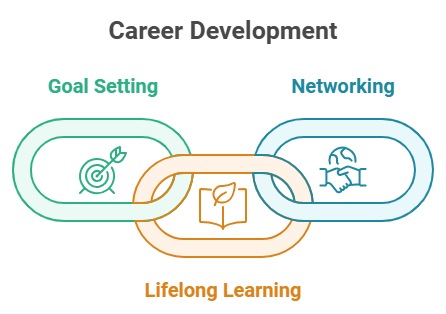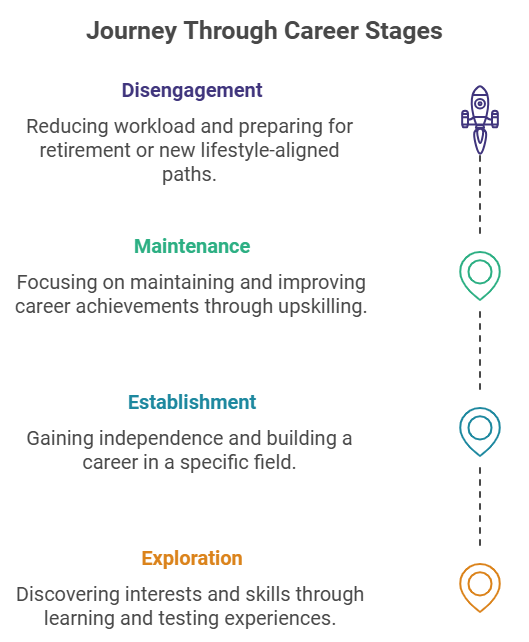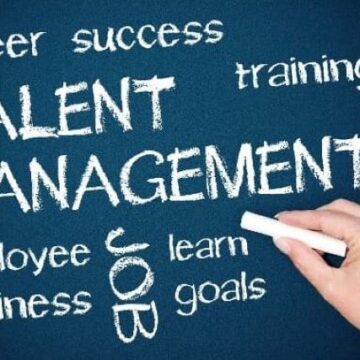
Career development, a phrase that holds substantial weight in the professional world, will be the focus of our discussion in this article. It is an area often shrouded in mystery, but one that demands attention for anyone interested in professional growth and success.
We will delve into the importance of this concept, the strategies that can lead to its successful implementation, and how it can shape one’s professional trajectory. Please join us as we unravel the intricacies of career development and equip yourself with the knowledge to propel your professional journey forward.
Related articles:
5 Tips to Promote the Professional Growth of Your Employees
How to Create your Own Skills Inventory Using No-Code Tools
What is Career Development?
Career development can be defined as a systematic planning method used by individuals for progression in their professional lives. This process encompasses a wide range of activities such as learning new skills, expanding knowledge in their field, networking with other professionals, and setting career goals.
It often involves a mutual effort between the individual and the organization; employers provide opportunities and resources while employees make use of these to grow and advance within their careers.
It is crucial as it not only benefits the individual by enhancing job satisfaction and employability but also benefits the organization by ensuring the availability of skilled and motivated employees.
In today’s digital age, personal branding is increasingly important for career growth. For professionals leveraging platforms like YouTube to share industry insights or thought leadership, some opt to buy YouTube likes for growth as part of their strategy to boost credibility and attract a larger audience. This digital presence can complement traditional career development activities, further enhancing visibility and influence in your field.
Frequently Asked Questions about Career Development
What is the role of an employer in career development?
The role of an employer here is multi-faceted. Employers help shape career development by providing opportunities for learning and growth within the company. This can include offering employee training programs, encouraging attendance at workshops or conferences, and providing access to resources such as mentorship programs.
Additionally, employers may offer opportunities for advancement within the company, fostering a culture of internal mobility. By doing so, they facilitate employees to gain new skills, increase their responsibilities and rise within the organizational hierarchy. Supporting career development is beneficial to employers as well, leading to increased employee engagement, productivity, and retention.
What are some proven strategies for achieving success in career development?
Successful career development is a result of strategic planning, continuous learning, and adaptability. Here are three proven strategies:
1. Set Clear Goals
Setting clear and measurable career goals is crucial. These goals provide a roadmap to track progress and stay focused. It can be helpful to set both short-term goals (e.g., obtaining a specific certification) and long-term goals (e.g., becoming a department head). Individual development plans can be used to visualize the employee’s goals and track the progress of each one.
2. Embrace Lifelong Learning
In today’s rapidly changing job market, continuous learning is essential. This could mean pursuing further education, attending workshops or seminars, or learning new skills relevant to your field. Embracing lifelong learning ensures you remain competitive and adaptable.
3. Network Actively
Building strong professional relationships can open up new opportunities and widen your knowledge about industry trends. This could involve attending industry events, joining professional associations, or engaging with peers online. Networking actively can increase your visibility and establish valuable connections in your field.

What are the different stages in a person’s career?
Career development typically progresses through four stages:
1. Exploration
At this stage, individuals discover their interests, skills, and values primarily through learning and testing experiences. This stage is typically characterized by change and uncertainty as individuals identify the types of careers that align with their personal attributes.
2. Establishment
This stage involves individuals gaining independence and taking responsibility for their career paths. They start to build a career in a specific field, often involving entry-level positions, and seek to prove competence, achieve job stability, and progress within the job.
3. Maintenance
During this stage, individuals seek to maintain their current career achievements and work on further improvements. They may focus on continued learning and upskilling to stay relevant in their field.
4. Disengagement
This is the final stage of career development, where individuals start to reduce their workload and responsibilities, generally in preparation for retirement. Some individuals may choose to explore new, less demanding career paths that align more closely with their lifestyle goals.

How important is networking for career progression?
Networking plays a significant role in career development, creating opportunities for learning, growth, and advancement. It allows individuals to exchange ideas, gain insights into industry trends, and access hidden job opportunities.
Networking also fosters professional relationships that can provide mentorship, partnerships, and endorsements, which can be beneficial for career progression. Therefore, it is essential to make networking an ongoing part of your strategy.
How does career development contribute to job satisfaction?
Career development significantly contributes to job satisfaction by fostering a sense of achievement and purpose in one’s work. With clear career goals and a path towards them, individuals are likely to feel more motivated and engaged in their jobs, creating a fulfilling work experience.
Furthermore, opportunities like skill enhancement programs or leadership roles not only bring variety and challenges into the work but also provide a sense of personal growth.
Moreover, the increased chances of upward mobility and recognition associated with career development often result in greater job satisfaction. As such, career development and job satisfaction are interlinked, each contributing to the enhancement of the other.
Can career development aid in increasing employability?
By continuously learning and acquiring new skills, individuals can remain competitive in the ever-evolving job market. Career development activities such as attending workshops, earning certifications, or undertaking leadership roles can demonstrate a commitment to personal growth and adaptability – qualities highly valued by employers.
Furthermore, networking, a crucial aspect of career development, can provide connections to industry professionals and potential job opportunities. Therefore, a commitment to ongoing development can greatly bolster an individual’s employability.
How can I set effective career development goals?
Setting effective career development goals requires self-reflection, planning, and a commitment to action. Start by assessing your current skills, interests, and career aspirations, identifying areas for improvement or advancement.
After this introspection, create SMART goals (Specific, Measurable, Achievable, Relevant and Time-bound) that align with your career ambitions. For instance, if you aspire to a leadership role, a possible goal could be completing a management certification course within the next year.
Break down larger goals into smaller, manageable tasks and track your progress regularly. Consider seeking a mentor or career coach for guidance and support.
Additionally, be flexible and willing to adjust your goals as your circumstances and industry trends evolve. Overall, effective goal-setting is an essential step in successful career progression.
How can investing in career management benefit an organization?
First, they foster employee engagement and satisfaction, which can lead to increased productivity and performance. Employees who see a clear progression path are likely to be more motivated and committed to the organization.
Secondly, these programs help to attract and retain top talent, giving the organization a competitive edge in the talent market.
Thirdly, by investing in employees’ skills and knowledge, organizations can build a strong internal talent pool, ready for succession planning and leadership roles.
Lastly, career development encourages innovation and creativity by giving employees the skills they need to embrace new technologies, methodologies, and ideas. Overall, a robust career management program can lead to improved business results and a stronger, more adaptable organization.
What resources can assist with career development?
Educational resources such as online courses, webinars, professional workshops, and certifications that help to upgrade skills and knowledge.
Mentorship is another crucial resource, where experienced professionals guide and provide advice for career progression.
Networking events, both virtual and in-person, provide opportunities to connect with industry professionals and learn about job opportunities and industry trends.
Books, podcasts, and blogs offer a wealth of knowledge and insights about specific industries and career paths.
Additionally, career counselors or coaches can provide tailored advice and strategies to help individuals reach their career goals.
Finally, on-the-job training and internships can provide practical experience and an understanding of the day-to-day tasks of certain roles. These resources, when utilized effectively, can significantly propel career development.




